#avvar
Explore tagged Tumblr posts
Text
Hey remember how in Inquisition, in Jaws of Hakkon, Scout Harding asks the Inquisitor to look for a missing scout she's worried about, Grandin, and then you find him and he's possessed but he's still himself, he and his rage demon are in agreement, he just wants to hunt your shared enemies for you, he's grieving, and you can let him live and let him keep working for you killing Hakkonites, and then later you can overhear the Avvar talking about him and he has indeed been killing Hakkonites, and they say he saved a child, and then they also say "But what he did to the hunters…" and they also say "I’d guess he’s god-touched and too weak for it," and you can overhear from Inquisition scouts that they heard he was dead, and you know that's not true but apparently that's the rumor allowed to go around, and Harding says he was good company, that he told terrible jokes but that was part of his charm
Just thinking about Scout Grandin and the way Harding initially reacts to Lucanis, and how she carries a single very expensive enchanted barbed arrow just in case he turns on them, and she says she knows it won't even be his fault if it happens.
632 notes
·
View notes
Text
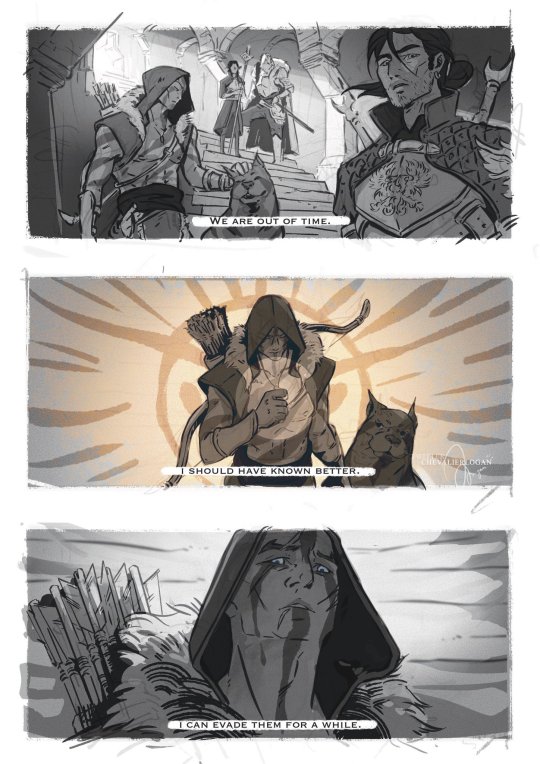
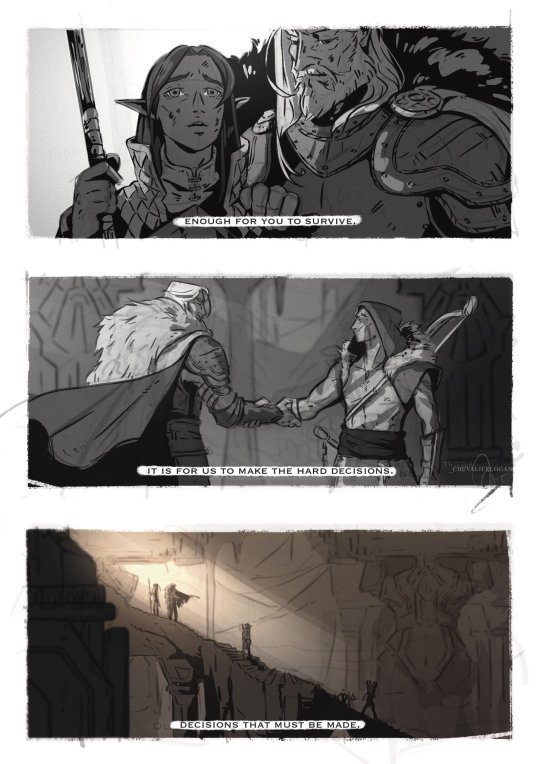
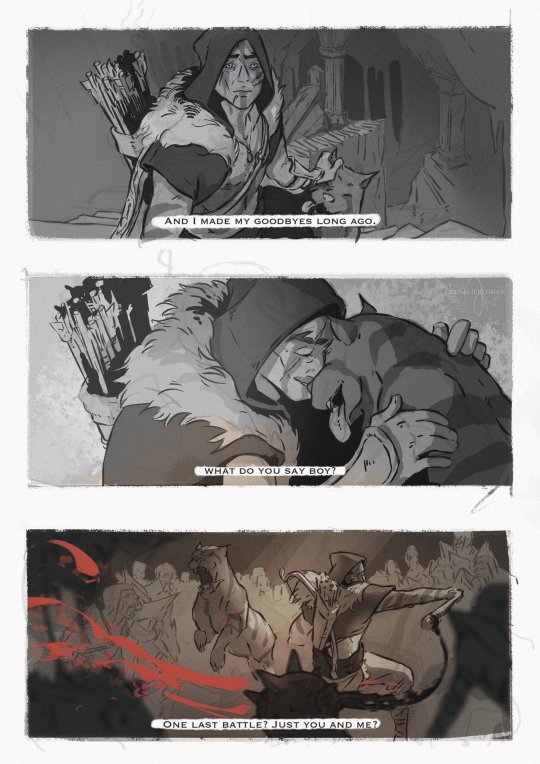
“Do you need to say good-bye?” Maric asked him cautiously. He shook his head. “No,” he rasped. “I did that long ago.” - Dragon Age: The Calling
#dragon age#bioware#legend mark zine#grey warde#grey warden#the calling#fiona#duncan#kell ap morgan#avvar#maric theirin#my art
968 notes
·
View notes
Text
Codex entry: On Avvar Cuisine
"What is thrown into the Avvar's cookpots? What isn't! Far from the delicate creams and sauces of Val Royeaux, or the rich pies and ripe cheeses beloved in Ferelden, the Avvar must subsist on whatever their mountain valleys provide. Nothing is too humble for their appetites, from the small, succulent snails found on hillside boulders to fern fiddleheads harvested in the spring. This is not to say the Avvar do not dine on more dangerous (but far more filling) fare. Harts, rams, gurguts, and lurkers are all candidates for communal evening meals taken around the fire. "Lowlander" spices, while not unknown, are great delicacies reserved for feasts. (In fact, my parting gift to the thane of Fennec-Tooth Hold was, at his request, ten jars each of black peppercorns, powdered mustard, and Antivan cord-seed.)
Avvar cooking methods favor utility. Stews are common because they can be simmered until nightfall with small fuss. Holds by lakes or rivers will wrap fish in clay and pungent leaves and leave it to bake all day over banked coals. Most Avvar food preparation, however, centers around winter. From the spring thaw onward, the hold is an endless hive of activity as meat is smoked, vegetables are pickled, and fruits are dried and stacked in crude dirt cellars in preparation for the long dark.
Despite this race against the seasons, the Avvar freely leave out rich cuts of meat and piles of plump berries on wood and stone slabs around their village. They believe these "offerings" propitiate a strange collection of beings they refer to as "gods" inhabiting the forest. The wise traveler attempts not to judge, and I was treated with all care due a guest, but I never became accustomed to the sight of good food left out by such a practical people."
—From The Further Journeys of Marquis d'Lussard, with an Emphasis on Food and Drink, with Full Illustrations by the Author
2 notes
·
View notes
Text
honestly I absolutely love the Avvar in Jaws of Hakkon. How they worship the gods, how they view the world around them, how accepting they are and just how interesting they are too. I absolutely despise how the Inquisitor and Companions make commentary as if they're stupid or wrong in their beliefs, or that they're "just crazy people who worship spirits".
The dialogue you don't choose or even the ones you do are on the line of condescending, and it's frankly insulting, especially that all options on the dialogue wheel fall on that line.
the Avvar are so fucking cool, I hate we only get a DLC with them. (I also miss the Chasind - I wish they weren't forgotten or left in the dirt by BioWare :( )
#dragon age#dragon age inquisition#dragon age: origins#dai#avvar#chasind#wish we got to learn more about them#also miss the chasind tbh#i know so little about them and at one part i thought the Chasind and Avvar were one and i was very wrong lol#its so close to the notion of colonization being necessary to save savages and its frankly quite gross#maybe im overthinking it but i really hate the inquisitor asking questions like 'but you just mean spirits not gods' in such a rude tone#like ok??? so they believe the local spirits are their gods as they shape the world around them#which even Dorian agrees with !!! he admits spirits often do shape the outside world where the veil is thin or when they have the chance#like during battle!!!#but sure inquisitor + company theyre just crazy 🙄
504 notes
·
View notes
Text
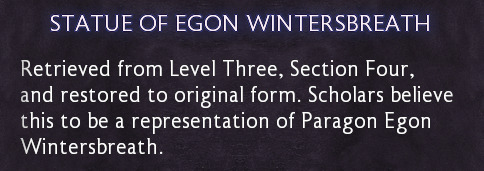
oh i have so many questions about this statue I just found in Kal-Sharok
Like... Wintersbreath. As in, Hakkon Wintersbreath? Born in battle, bloody-bladed? Wintersbreath to wrack the lowlands, cold to cut and kill the hated?????
This might be a bit of a tinfoil hat moment because I don't believe I've heard this before, but... would it really be such a stretch of the imagination to assume that there might be a faint thread of connection between the ancient dwarves (now the dwarves of of Kal-Sharok) and the Avvar through this, the Titans, and the separation of Stone and Skies??? Though the setting is still one ostensibly without real deities, could Korth the Mountain-Father still have something to do with the literal mountains?
(honestly, Hakkon Wintersbreath having been an ancient dwarven warrior/warlord from the time before the dwarves would have fully retreated into the bodies of the titans, and the surface elevating him to godhood over time while the dwarves of Kal-Sharok carried on his name in their family lines and made him a revered ancestor would be so fucking interesting to me. I want to gnaw on this juicy-ass bone until I can slurp out all of its delicious lore-marrow.)
#squirrel plays datv#dragon age#dragon age the veilguard#i need to re-read everything about the avvar and the alamarri and the chasind#and all the scattered human tribes of thedas
20 notes
·
View notes
Text

Avvar Companion Card ft. Gunnjar
#my art#art#gunnjar#avvar#dragon age fanart#dai#dragon age#tarot card#tarot design#ehhh i think its done?#i'm at the point where i might overwork it so imma just post and leave it be for now#dragon age tarot#maybe i'll post a side by side of the first one i did?
369 notes
·
View notes
Text
This becomes five times funnier if you subscribe to the theory that Hakkon the Wintersbreath used to be Geldauran.
Okay but they missed SUCH an opportunity with an Avvar Rook and/or companion. Bc the revelations about elves and spirits and gods would just be NOTHING. Spirits are their gods. This is just something that apparently Happens every few hundred years. Then everyone just goes out an kills a god and goes back home for drinking and singing and sex. Typical Tuesday in the Hold.
Bellara: My gods are real spirits that embodied themselves to rain chaos down on Thedas and I'm having a hard time with that...
Avvar!Rook: LOL yeah. But that's like...what the gods do, amirite? Take over a dragon or something, set shit on fire for a while, and then you gotta go kill them and put 'em back in the Fade for Time Out for a bit until they calm down. Lather, rinse, repeat.
Bellara: ... ... ...Okay, but we came from spirits...
Avvar!Rook: Right, the gods! :)
Bellara: No, but they're not real gods because they...were also people who did horrible things.
Avvar!Rook: The gods have each have their own personalities. Some of them are not very nice. That's why we kill them. :)
Bellara: ...I feel like you are way too calm about this.
67 notes
·
View notes
Text
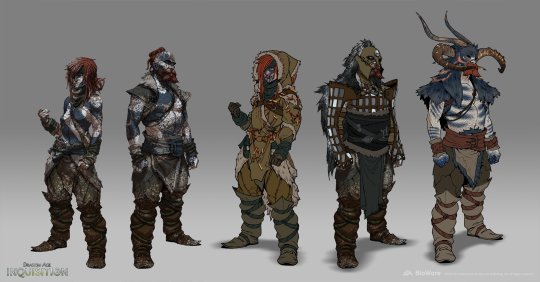
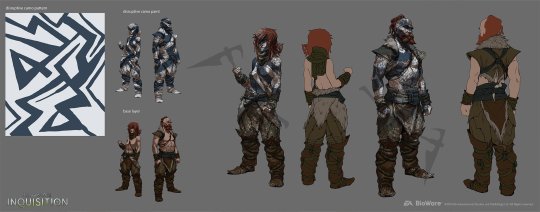
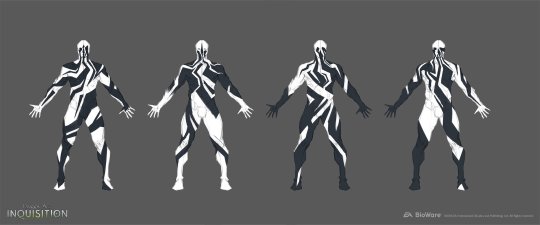
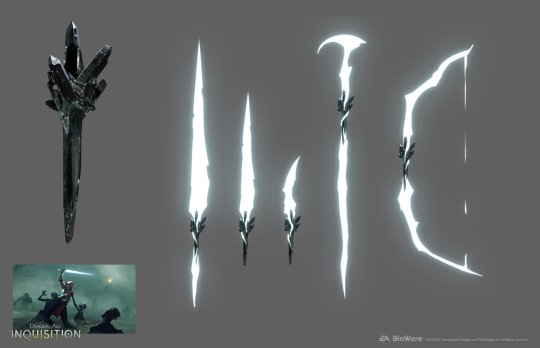
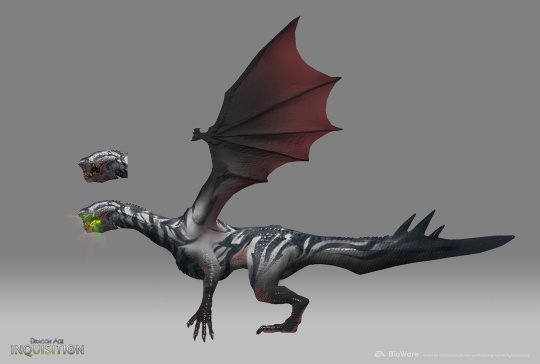
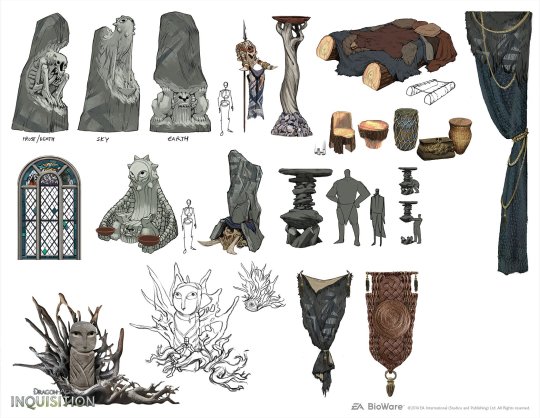
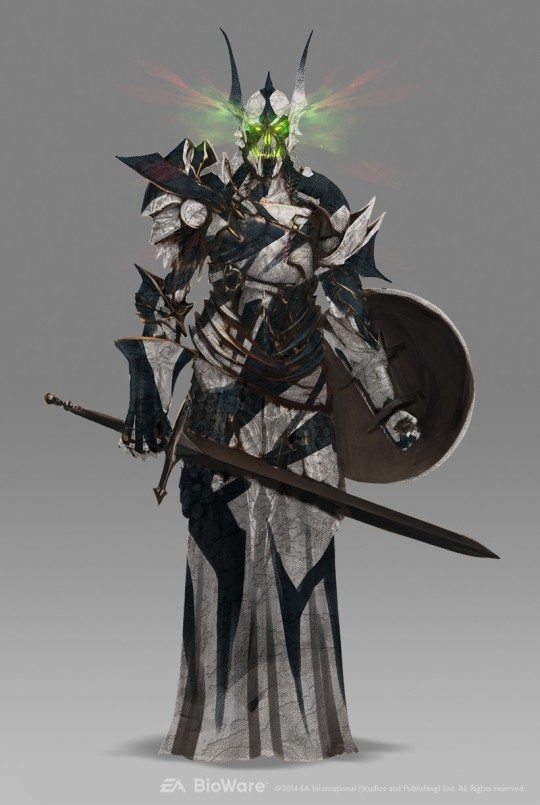
Avvar from the Jaws of Hakkon DLC by Matt Rhodes
Concept Art Game Look
176 notes
·
View notes
Text
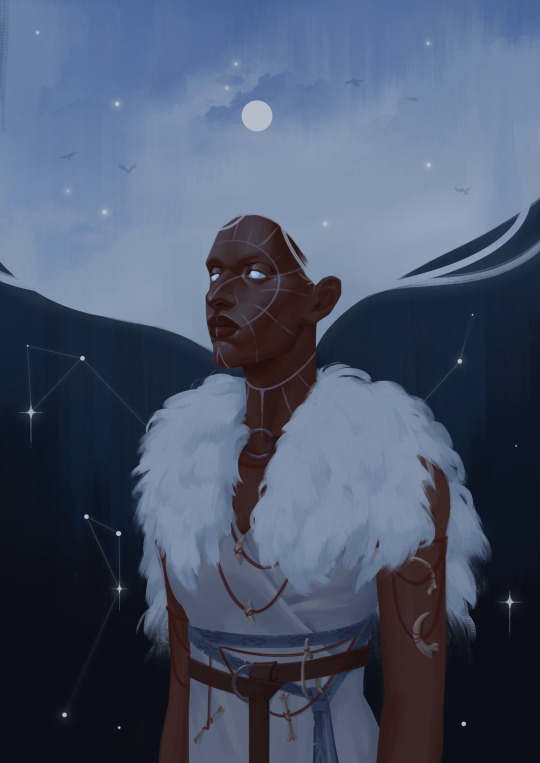
An interpretation I did of Lady of The Skies for Dragon Age Avvar zine! @legend-markzine
232 notes
·
View notes
Text

Cultural Views and Interactions with Spirits Across Thedas
The cultures of Thedas have vastly different relationships with spirits, shaped by history, faith, and tradition. While some societies embrace spirits as allies, teachers, or even deities, others regard them with suspicion, fear, or outright hostility. These views often reflect each culture's relationship with magic, the Fade, and the Chantry's teachings.
Broadly speaking:
Northern Thedas tends to demonstrate more openness and integration with spirits.
Central Thedas is likely influenced by both Northern and Southern Thedas, resulting in an amalgamation of cultural beliefs.
Southern Thedas is heavily influenced by Chantry doctrine, enforces stricter separation and suspicion.
The significant exceptions, such as the Avvar tribes and the Dalish elves, whose unique spiritual beliefs set them apart.
Then, we have the Circle of Magi.
Northern Thedas

Tevinter Imperium
Cultural View: In Tevinter, spirits are seen as tools, allies, and occasionally even advisors. Magic and spirits are deeply integrated into society, and the Chantry's warnings are largely...interpreted differently than southern Thedas in favor of practical application. Tevinter mages will often bind spirits and compel them into service.
Key Spirit Interaction Example: In DAI, Dorian speaks openly about spirits with respect, showcasing Tevinter's pragmatic—if morally gray—approach to spirit magic.
(source: Tevinter, Spirit)

Rivain
Cultural View: The Rivaini people, heavily influenced by their Seers, view spirits as part of the natural and spiritual order. Spirits are seen as protectors, teachers, and sacred presences.
Interactions:
- Seers: Rivaini hedge witches, known as Seers, communicate directly with spirits. Southern Thedas believes that Seers often allowing themselves to be possessed willingly for the benefit of their communities. However, in the codex entry ‘Riviani Seers and Spirits,’ Taash notes that the Seers aren't possessed at all. The Seers simply open themselves up and share their body. - Spirit Amulets: Seers craft "Amulets of the Unbound," magical talismans that protect spirits from blood magic and binding rituals. - Spiritual Integration: Spirits are welcomed into villages and trusted to guide important decisions or provide aid in crises.
Key Spirit Interaction Example: During Taash's personal quest, a Rivaini Seer allows a spirit to speak through her rather than fully sharing her body. The spirit, having spent considerable time around the Ancient Qunari, respected the Qun's beliefs about possession but still wished to offer its assistance.
(source: Rivain, Spirit)

Antiva
Cultural View: The Fade Codex is theorizing that it appears that in Antiva, spirits are neither overtly worshipped nor deeply feared but are instead accepted as a natural part of the world. The Antivan people generally remain untroubled by the occasional presence of spirits.
While Chantry teachings are widely followed in Antiva, they seem less rigid compared to the stricter interpretations in the South—likely a result of Antiva's origins as a nation founded by pirates and mercenaries, who valued pragmatism and adaptability over dogma.
Key Spirit Interaction Example: The Treviso marketplace, there are spirit cats lounging around, which reflects Antiva's relaxed approach to spirits, to some degree.
(source: Antiva, Spirit)
Central Thedas

Nevarra
Cultural View: Nevarrans have one of the most unique relationships with spirits in Thedas, deeply intertwined with their cultural views on death and the Fade. Spirits are seen as natural caretakers of the dead and necessary intermediaries between the mortal world and the afterlife.
The Mourn Watch (an elite group of Mortalitasi) avoids using the term "demon." Instead, they refer to what most of Thedas would call a "demon" as a "maligned spirit."
Interactions:
- Mortalitasi Mages: These spiritual leaders interact directly with spirits, often guiding them in rituals surrounding death and the Fade. - Guardians of Tombs: Spirits are sometimes bound to tombs or structures, protecting the dead and ensuring the Fade remains undisturbed. - Rituals of Passing: Spirits play an essential role in guiding souls to their rest.
Key Spirit Interaction Example: In DATV, we see a number of different interactions in the Grand Necropolis regarding spirit interactions. Such as benign spirits being placed in skeletons to help with the upkeep of the building, Curio and Keepsake helping with the return on Manfred, etc.
(source: Nevarra, Spirit)
Southern Thedas
Ferelden and Orlais
Cultural View: Both Ferelden and Orlais follow strict Chantry teachings, viewing spirits with fear and suspicion.
Interactions:
- Spirit interaction is largely confined to the Circle of Magi and heavily monitored by Templars. - Any uncontrolled interaction with spirits is viewed as dangerous, with possession considered an abomination.
Beyond the Chantry's Reach: The Avvar and Dalish Spirit Traditions

Avvar
Cultural View: The Avvar revere spirits as "gods," integrating them into their culture, mythology, and daily lives. Spirits are not merely distant entities but active participants in Avvar society, deeply interwoven with their survival, rituals, and spiritual guidance. Unlike the Chantry's fear of spirits, the Avvar see them as powerful allies deserving respect and proper rituals to maintain harmony.
Neither the Chantry nor its Templars are welcome in the Frostbacks, as Avvar rituals often involve spirits speaking through their casters—practices the Chantry would deem heretical. However, the Avvar are deeply aware of the dangers of spirit interactions and have developed rituals to safeguard against corruption and possession.
Interactions:
Augurs – Spiritual Leaders:
The Augur, chosen from the hold’s mages, serves as a mediator between spirits and the hold, interpreting omens, guiding rituals, and advising the Thane. They appease spirit gods through ceremonies to protect the hold and drive away malevolent spirits. Augurs allow apprentices to host spirits temporarily, teaching mages patience and control over their magic. If an apprentice fails to release the spirit through ritual or risks corruption, they are quietly executed to prevent harm.
Spirit Bonds:
Spirits actively participate in Avvar life, guiding warriors, aiding mages, and protecting the hold from harm. These bonds are built on respect and reciprocity, with spirits offering blessings, wisdom, and strength in return for proper reverence.
Combat and Spirits:
During ritual combat, spirits are drawn to Avvar warriors, enhancing their reflexes, strength, or endurance. This bond resembles the connection seen in Spirit Warriors, with warriors embracing spirits as sacred allies in their battles.
Ritual Safeguards:
The Avvar use structured rituals to ensure spirits do not linger in mortal hosts or become corrupted. These traditions, developed long before the Circle of Magi, reflect a deep understanding of spirit behavior and the Fade.
Spiritual Duties:
Augurs also prepare the dead for the Lady of the Sky, interpret omens from nature, and preserve the old songs and lore of their people.
Key Spirit Interaction Example: In DAI, Avvar shamans openly invite spirits to aid their people, fostering deep trust and cooperation. Warriors receive spiritual blessings during combat, and mages learn magic through spirit guidance, reflecting the Avvar's balanced and structured approach to spirit interaction.
(Source: Avvar, Spirit)

Dalish Elves
Cultural View: The Dalish hold a deeply cautious view of spirits. While they do not inherently view demons as evil, they see all spirits as wild and dangerous, comparable to untamed animals.
Interactions:
- Dalish mages are expressly forbidden from using spirit magic, as spirits are considered unpredictable and inherently risky. - Felassan's Insight: The Dalish believe demons are not evil but are dangerous if treated carelessly. - Merrill's Perspective: In DA2 Merrill reveals that the Dalish believe "there's no such thing as a good spirit."
Key Spirit Interaction Example: Merrill's attempts to interact with spirits and her controversial use of blood magic highlight the tension between Dalish caution and the pursuit of knowledge.
(source: Dalish, Spirit)
The Circle of Magi: Doctrine, Control, and Spirit Interaction
Spirit Healers
Cultural View: Within the Circle of Magi, Spirit Healers represent a unique and often controversial branch of magical study. These mages form bonds with benevolent spirits—typically those embodying fortitude, compassion, hope, or faith—to channel restorative magic that far exceeds the capabilities of traditional healing spells.
While the Chantry acknowledges the value of Spirit Healers, particularly in times of war or crisis, the Templars remain deeply suspicious of their practices. Spirit Healers walk a precarious line in the eyes of the Circle, seen as both invaluable assets and potential risks, as their reliance on spirits is viewed as dangerously close to inviting possession.
Interactions with Spirits:
Benevolent Bonds: Spirit Healers summon and form connections with spirits of compassion, hope, or fortitude, persuading them to lend their power to heal wounds, restore vitality, and alleviate suffering.
Spirit as an Ally: The spirit does not typically cross the Veil fully but instead channels its power through the mage, acting as an ally rather than a master or servant.
Advanced Healing: While standard healing spells can mend physical injuries, Spirit Healers can cure grievous wounds, cleanse diseases, and even stabilize those on the brink of death with their spirit’s aid.
Role Within the Circle:
Desirable Yet Distrusted: Spirit Healers are highly valued for their unparalleled healing abilities, especially in times of war, plagues, or crises. However, their reliance on spirits causes them to be monitored closely by Templars for any signs of corruption or possession.
Rare Practice: Few mages pursue this path due to the intimate bond required with a spirit and the risks associated with such relationships.
Templar Suspicion: Templars remain wary, fearing that the line between collaboration and possession is dangerously thin for Spirit Healers
(source: Spirit)
#thefadecodex#dragon age#dragon age 2#dragon age inquisition#dragon age the veilguard#da#da2#dao#dai#datv#the fade#da spirits#Solas#because he is the Fade Daddy#chantry#the nature of spirits#cultural views of spirits#dalish#avvar#spirit healer#tevinter#tevinter imperium#rivain#veilguard#antiva#treviso#nevarra#mortalitasi#mourn watch#emmrich volkarin
88 notes
·
View notes
Text
What Avvar mage training tells us
Not enough people talk about the Avvar, which is a shame because they have some amazing history and practices. I find the way they handle mages to be especially enlightening and based as fuck.
So I made this post to summarise it!
In the above video, I captured two conversations with the Augur of Stone-Bear Hold, and Sigrid - the mage-in-training who went into a self-imposed exile. I'll summarise what mage training looks like for the Avvar, and then delve into the implications.
Augurs are the spiritual leaders of the Hold, but are not necessarily mages - though they often are.
Spirits are called 'gods' by the Avvar. The Avvar do also have named gods, and these appear to be particularly powerful spirits.
Mages among the Avvar bind themselves to a spirit in order to be trained - i.e., they become 'abominations' in the eyes of the chantry, which Dorian confirms in the video. This occurs at a young age, in Sigrid's case when she was a child.
The spirit becomes the mage's trainer. Years later, when the training is done, the mage releases the spirit in a ritual which requires only a small sacrifice (like a bird) and a vial of lyrium.
If a mage cannot release the spirit, then the situation is handled carefully. In Sigrid's case, she just didn't want to say goodbye to a good friend. She goes to the Augur after this, and he confirms that they are working on helping her overcome her loneliness.
If the reason is they are truly incapable of releasing the spirit (they are 'weak', though it's unclear what this means), then the Hold and spirits watches over them to prevent them from growing 'sick'. The Augur implies that if the mage does sicken and endangers themselves or the Hold, they are euthanised and pass away peacefully in their sleep. He says it is a very sad event.
What are the implications of this, then?
Reversing 'possession' can actually be really easy. We knew it was possible from DAO, but now we see that it need not require a massive amount of lyrium or blood magic. If the 'possession' does not happen in a state of extreme desperation/distress (which the Circle and Templars love to put mages in), then reversal is simple.
Mages who cannot release the spirit might 'sicken' - and I suspect that's what they tried to show with Anders. What 'sicken' means is not clarified by the Augur, but from our Anders experience we can piece together that the Augur means they grow mentally and physically unwell. But even this can be prevented or mitigated with proper care.
It appears to be very, very rare that mages among the Avvar turn into the types of abominations we fight in the games, because the Augur never even mentions it happening.
So, in conclusion: The Avvar treat their mages with the most humanity and compassion of everyone, resulting in very few instances of violent abominations.
(Note: tbh I have no idea wtf the Dalish mage training is like because the games contradict themselves even within the same clan, so I can't really draw comparisons to the Dalish, unfortunately.)
#dragon age#dragon age inquisition#dai#da2#dao#avvar#mages#mage rights#the avvar#dragon age origins#dragon age 2
537 notes
·
View notes
Text
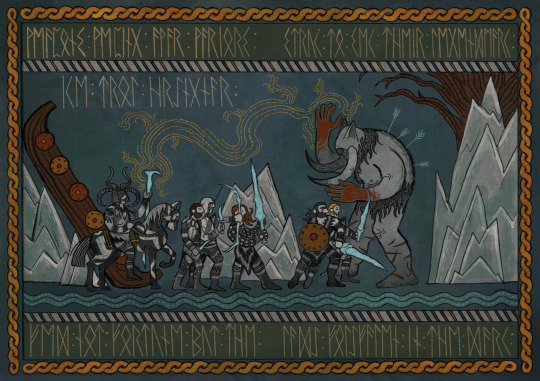
A piece I did for a zine on twitter…The Tale of Hryngnar, Ice-Troll in the style of a nordic tapestry 🗡️
#tallosart#dragon age#dragon age inquisition#dai#joh#jaws of hakkon#avvar#norse#nordic#tapestry#bioware
167 notes
·
View notes
Text


Battle of Korth Mountain-Father and Nathramar
Morrighan’nan versus Luthias Dwarfson
my contributions for @legend-markzine
#dragon age#dragon age fanart#korth mountain father#nathramar#morrighan‘nan#luthias dwarfson#avvar#legend mark zine#zazrichart#procreate#rebelle
124 notes
·
View notes
Text

#my art#dragonage#dragon age inquisition#dai#dragon age veilguard#rookanis#dragon age tarot#teia cantori#viago de riva#teia x viago#zevran arainai#teiago#treviso#antivan crows#andarateia cantori#sketch#lucanis#teia#avvar#dalish#dragon age rook#love
25 notes
·
View notes
Text

So late to posting this but here's my final piece for @dragonageannual 2025 for February! My piece is centered around the Lady of the Skies, the Avvar goddess of the sky. I included a lot of birds, trying to focus the most on the ptarmigan, which is one of the Lady's most favored. Since we never get much of a humanoid depiction of the Lady in the game art or really a description of any kind, I took some liberties on her appearance. I gave her Avvar war paint on her body, a rib cage top as an homage to the Avvar tradition of "sky burials", and a ptarmigan inspired mask with the eye symbol often used to depict her in Avvar imagery. I also thought it would be fun to give her hair that resembled clouds. In the back I tried depicting Lake Calenhad, which is made from her tears, as well as the Frostback Mountains. Very honored to be part of this project, thank you so much for having me!
#dragon age#dragon age annual#dragon age calendar#lady of the skies#avvar#dragon age avvar#avvar goddess#art
33 notes
·
View notes
Text

Wip for a dai Avvar companion card
#art#my art#avvar#gunnjar#dragon age fanart#da#dragon age#wip#the comp needs some work and i need to slap on maybe 12 more textures lmao#and rendering. lots to do still
204 notes
·
View notes